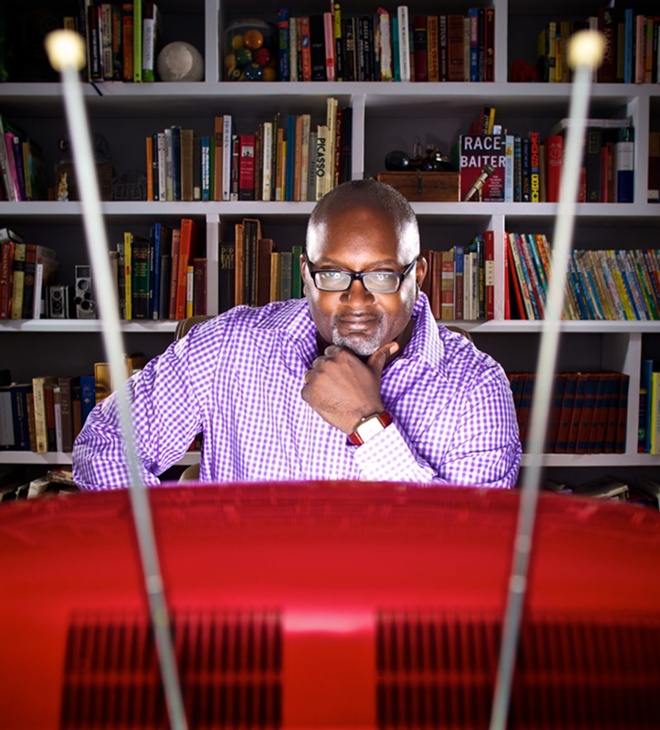What do you do when Bill O’Reilly calls you a name?
Here’s one option: Turn the epithet into a book title.
That’s exactly what Tampa Bay Times media critic has done with the title of his insightful, entertaining and at times nervy new book, Race-Baiter: How the Media Wields Dangerous Words to Divide a Nation.
When the Fox News star slammed Deggans as “one of the biggest race-baiters in the country” in 2008, it wasn’t the first time O’Reilly had fired back at him. But Deggans says he now wants to define on his terms what he does for a living.
“In a weird way, I’m saying that if his definition of a race-baiter is what I’m doing, then let me sort of tell you what that means, and why I think more people should be doing it.”
What he’s doing, he says, is trying to defuse the stereotypes, gender biases and code words that people say they oppose, at the same time they’re pushing those buttons to galvanize their audience share.
“The best way to defuse that is to talk about that. And sometimes when you talk about it, the people who are benefiting from that turn around and say, ‘You are the race-baiter’ … When the white person is calling you a race-baiter, you know you’ve really hit on something.”
What he’s trying to do with Race-Baiter is one of the most fundamental things a thoughtful media critic can do — bring a fresh perspective to the media the rest of us consume, and perhaps raise our consciousness in the process.
And even though Deggans refers to himself self-deprecatingly as just a “regional critic,” he’s gaining a national profile for just this kind of outside-the-box — or beyond-the-screen — thinking.
Eric Deggans has been writing about pop culture in one form or another for over 20 years. After graduating from Indiana University (he grew up in Gary, the hometown of Michael Jackson), he had aspirations of being a professional musician, playing drums with a funk group called the Voyage Band that was signed to Motown Records. But those musical dreams crashed when the album was never released (though he still sings, plays bass guitar and drums), so he put in a call to the editors at the (now defunct) Pittsburgh Press about getting a job in journalism. After that paper was sold, he worked for six months at the Pittsburgh Post-Gazette, and then moved on to the Asbury Park Press in New Jersey, where he became the pop music critic.
His ascendancy continued when he took over for Tony Greene in 1995 as pop music critic for the Times, and a little more than a year later he moved to the TV beat. In 2004 he joined the editorial page, but after a year he returned to being the full-on television and media critic and began The Feed, his daily Times blog on all things media. From that vantage point, and on national platforms like CNN’s Reliable Sources, he’s been able to track the changes in the media landscape.
As everyone knows, those changes have been dramatic over the past few decades, thanks to cable and the Internet. For conservatives, that’s a good thing, beginning with the explosion of talk radio in the 1980s and ’90s (led by the King, Rush Limbaugh). Then came the Mothership, Fox News, in 1996. The aughts brought forth the blogosphere, where both liberals and conservatives have carved out spheres of influence. And that’s where people like the late Andrew Breitbart and his disciples have sought to cut liberals and liberal ideals down to size.
Deggans says the expansion of media options has led to what he dubs the “tyranny of the broad niche,” the most salient example being Fox News, whose pundits make little effort to stretch beyond mainstream cultural norms.
“Instead,” he writes in Race-Baiter, “white culture is presented as the benchmark of normalcy and a yardstick for appropriate behavior, without even acknowledging that white people have a separate cultural identity of their own.”
But Deggans doesn’t call O’Reilly or Andrew Breitbart a racist.
“Everyone’s trying to get an audience in media, everyone’s trying to expand. The question is, ‘How are you doing that?’… I’m not trying to say that people are bad people. I’m trying to say they’re talking about things in bad ways.”
But he will say of the late Andrew Breitbart that “it seems to me he was willing to use prejudice messages to win political fights and to triumph in media. And that to me is enough to say, that’s not good. That’s not cool.”
Breitbart’s deceptive video snippet of Shirley Sherrod, which unjustly led to her being ousted from her job two years ago at the Department of Agriculture, is a case in point. The conservative blogger had selectively edited a speech by the African-American woman to make her sound racist. A later broadcast of the entire video showed in fact just the opposite. Ultimately the White House apologized, but Breitbart never did (Sherrod’s defamation lawsuit against Breitbart continues, seven months after his death by a heart attack at the age of 43.)


